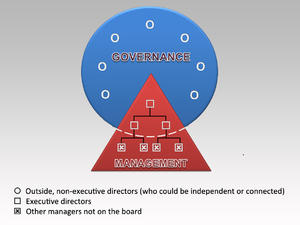
All organisations have to find an appropriate balance between central control and local freedom to act. Governance provides the framework and checks and balances within which this is established and managed. It ensures that the process by which decisions are made is appropriately managed. It allows them to be seen to have been taken in the best interests of the shareholders, taking account of all the demands on the organisation, the risks, and the information available at the time.
Review your governance
If several of the following statements are true of your organisation, it may well be a good idea to review your governance arrangements.
- The governance structure (meetings and delegations) does not constitute a simple hierarchy underneath the Board, with clear parent-child relationships and information cascaded up and down the hierarchy
All authority derives from the Board (or equivalent), and no-one has any authority (including the authority to sub-delegate) unless given it explicitly or implicitly by the Board. Consequently all delegations and sub-delegations should form a tree structure with the Board at the top. Any structure which does not follow this rule will create confusion about where authority lies. Decisions and issues for escalation, and reports of lesser decisions taken, should flow up the tree. Policies, strategies, decisions made, etc, should flow down. This is not to say that the structure has to be complicated or bureaucratic – every organisation has to find the balance that is right for it.
- The governance structure is not clearly documented (e.g. including a consistent set of Terms of Reference), communicated and understood
The governance structure exists to serve the organisation. It can only do this if people in the organisation understand it. Clear documentation that resolves any apparent ambiguities is an essential starting point, but this then needs effective communication.
- People do not have clear written instructions as to the limits of the authority that they have been given, or these are ignored
This is part of the essential documentation of the structure. Without a clear statement of what they should decide for themselves and what they must refer elsewhere for decision, unhelpful deviations from intentions (in both directions) will occur. In one case senior time is wasted, in the other unintended risks may be taken. Naturally the limits specified need to be appropriate. Compliance must be monitored and enforced.
- Committees are allowed to approve their own Terms of Reference and/or memberships
In order to ensure that the governance structure retains its integrity, any ‘parent’ body making delegations must retain control of the terms of the delegation. Approving ToRs and committee memberships are the primary ways it can do this. A committee approving its own ToRs is like someone signing off their own expenses.
- Governance meetings happen irregularly, or with papers which are poor quality or issued late
Unless meetings are irregular because they are only arranged when needed, irregularity makes it very difficult for those requiring decisions from the meeting to plan. That in turn leads to papers which are of poor quality or late, and so to delayed or riskier decisions.
- Senior staff are allowed to ignore the rules which apply to others
Governance, like the law, only works properly if everyone plays by the rules. If the CEO believes it matters, he or she will be willing to set a good example by sticking to the rules themselves, and will expect other people to do the same. If the CEO does not think it matters, and is not willing to do this, it will be very hard to make other people do so.
- Decisions are often taken late because of papers missing submission dates, inadequate information, wrong attendance, submission to the wrong meeting, unexpected need for escalation, etc
There are many reasons why a decision may be reached later than it was really needed. Sometimes the request may have been made to a meeting which did not have authority for that decision, perhaps because the value was too high, or because the decision was out of scope. Sometimes a critical expert is absent from the meeting. Sometimes the supporting paper does not contain, and the presenter is unable to supply, information the committee regards as essential. Mostly, however, these come down to poor planning, often driven by poor understanding.
- There is a feeling that the governance process is too bureaucratic
If the system has been well-designed, this should be a rare complaint. Most commonly, it occurs for one of two reasons: levels of delegation have been set lower than the people concerned are comfortable with, or there is a reluctance to engage with the hard thinking required to make cases concisely but effectively. If significant, it probably indicates a mismatch – in either direction – in maturity between the staff concerned and the governance arrangements.
Contact Ottery Consulting if you would like some independent help with to review your governance arrangements.

